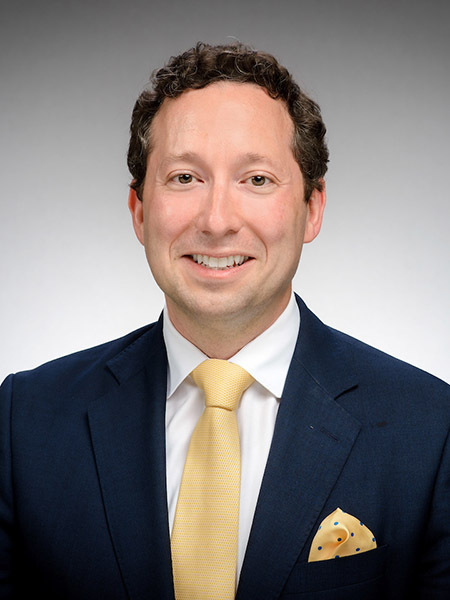Economist Kirk Doran wins UK’s Panmure House Prize honoring interdisciplinary research

Kirk Doran, an associate professor in the Department of Economics at the University of Notre Dame, has won the 2024 Adam Smith Panmure House Prize.
Established in 2021, the prize is named after the forefather of economics and celebrates those who embody his empiricism and long-term interdisciplinary thinking in their research. One of the United Kingdom’s largest academic prizes open to researchers globally, it has been awarded to emerging academic leaders across multiple disciplines, including a business academic, a neurologist and an anthropologist.
“I feel honored and privileged to win the Panmure House Prize. Adam Smith has been an inspiration to me since the first time I began studying social structures and the economy as an undergraduate,” Doran said. “I am particularly inspired by the prize’s aim to explore the relationship between long-term thinking and radical innovation. This is exactly what our current incentive structures both within and outside academia under-incentivize, and that is why Panmure House’s work is so essential here.”
Like Smith, Doran asks fundamental questions that are often hard to find a definitive answer to because they are so overarching. In his research, Doran seeks to identify where and how new knowledge is created in order to ultimately find the cause of long-term per capita economic growth.
Through his subfield of innovation economics, Doran aims to use techniques developed by modern labor economists to answer questions that had been long debated without progress until these techniques were developed. He has applied empirical tactics to measure knowledge generation through bibliometric analysis of interdisciplinary databases — such as papers, patents and medical trials.
His studies find that the development of new knowledge is ultimately based on collaborative relationships in which people inspire and challenge one another.
“We are delighted to see Kirk Doran’s research receive this international recognition,” said John T. McGreevy, the Charles and Jill Fischer Provost. “The Panmure House Prize’s emphasis on long-term, interdisciplinary thinking mirrors the University of Notre Dame’s commitment to scholarly innovation and excellence across the disciplines.”
Doran was one of four finalists from leading global institutions to be considered for the Panmure House Prize. He was supported in pursuing the award by the Office of the Provost and the College of Arts and Letters’ Institute for Scholarship in the Liberal Arts.
With this recognition, Doran plans to continue examining how new knowledge impacts per capita economic growth with a multidisciplinary team. He hopes it will have a policy impact that can benefit productivity.
“I think my research will help to refocus our policy efforts regarding long-term economic growth to the encouragement of deep collaboration among innovative people,” he said. “It is not enough to better educate our workforce or even produce more entrepreneurs, scientists and inventors; such efforts could not possibly produce long-run economic growth unless these individuals enter periods of deep collaboration with each other in the joint production of knowledge.”
Originally published by at al.nd.edu on Oct. 7.
Contact: Tracy DeStazio, associate director of media relations, 574-631-9958 or tdestazi@nd.edu
Latest Colleges & Schools
- Prioritizing prenatal care may decrease low birth weight outcomes in The Gambia, Notre Dame research findsA new study co-authored by University of Notre Dame researchers highlights the importance of prenatal care for improving the health of mothers and newborns, providing evidence that can inform policy.
- Partial peace deals may facilitate comprehensive accords, offering roadmap for policymakers, practitionersPartial peace agreements — deals that address targeted issues on the way to larger comprehensive accords — could provide a blueprint for peacebuilding policymakers and practitioners, according to new University of Notre Dame research.
- Notre Dame Law School launches new Veterans Law ClinicNotre Dame Law School is launching a new Veterans Law Clinic, dedicated to providing free legal assistance to U.S. military veterans in matters such as disability claims and appeals.
- City of Gary and Notre Dame’s Housing and Community Regeneration Initiative announce vision and action plan for downtown GaryThe City of Gary and the University of Notre Dame School of Architecture’s Housing and Community Regeneration Initiative announced a “Vision and Action Plan” for downtown Gary during a news conference Tuesday (May 27). The final report serves as a roadmap for Gary’s leadership to follow to reestablish the city’s building culture.
- Notre Dame Executive MBA offers scholarships to area leadersMichiana Forty under 40 honorees can receive $30,000 toward tuition for the Notre Dame EMBA program.
- Kenneth Scheve appointed dean of the University of Notre Dame’s College of Arts and LettersKenneth Scheve, the Dean Acheson Professor of Political Science and Global Affairs and the dean of social science at Yale University, has been appointed the I.A. O’Shaughnessy Dean of the College of Arts and Letters by University of Notre Dame President Rev. Robert A. Dowd, C.S.C. Scheve, who will also hold a tenured faculty position in the Department of Political Science, begins a five-year term as dean on July 1.













